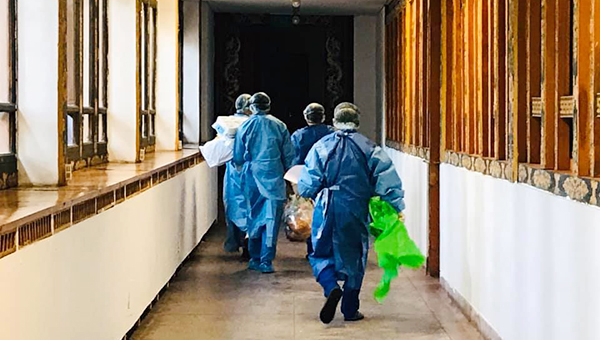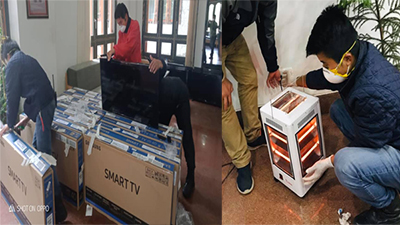 Since the first confirmed COVID-19 case in the country on 5th March, health workers have been working round the clock to ensure the disease is contained at the earliest. And looking at how things are operating, the efforts entail a lot of sacrifices, so much so, that they have to live away from their home and family.
Since the first confirmed COVID-19 case in the country on 5th March, health workers have been working round the clock to ensure the disease is contained at the earliest. And looking at how things are operating, the efforts entail a lot of sacrifices, so much so, that they have to live away from their home and family.
According to the Prime Minister, nine health professionals are looking after the COVID-19 patient. They work in shifts with travel limited to the ophthalmology suite where the patient is kept isolated and their identified lodge.
“There is just one car to transport the health workers to and from the patient. That designated driver, dressed in surgical mask, caps and all the essential clothing drops them to their identified lodge and provide them meals. And the driver again brings them back to the patient. So they just travel to these two places. They are like prisoners. After having served for 10 to 11 days, they will be tired. They are not allowed to meet families and even if their family members fall sick, we can’t send them,” said Dr Lotay Tshering, the Prime Minister.
Similarly, the quarantine centres in Paro, Thimphu and Punakha, where the primary contacts of COVID-19 patient are kept, are manned by three to four health workers.
“Our health workers’ main job is to check the quarantined people twice a day and anytime people feel sick so that they give the basic medicine that we have there. We also have ward boy posted there, basically to visit the quarantine rooms every day and clean the rooms. For example, if there is any waste, he puts it in the waste bin and sends it for incineration. These people also have to be quarantined for 14 days,” said Dr Pandup Tshering, the Director-General for Department of Medical Services at the Health Ministry.
No visitor is allowed at the quarantine centres, Even the food is left at the reception.
According to the Health Ministry, suspects at the quarantine centres in Paro, Thimphu and Punakha are provided with all required facilities.
 “During the quarantine period, we have kept them in a designated place providing them with all the necessary amenities. Like for example, we are providing with heater, television, WiFi and we are serving them with packaged food,” he added.
“During the quarantine period, we have kept them in a designated place providing them with all the necessary amenities. Like for example, we are providing with heater, television, WiFi and we are serving them with packaged food,” he added.
Currently, 62 first contacts are quarantined and 330 secondary contacts are in self-quarantine.
Sangay Chezom








